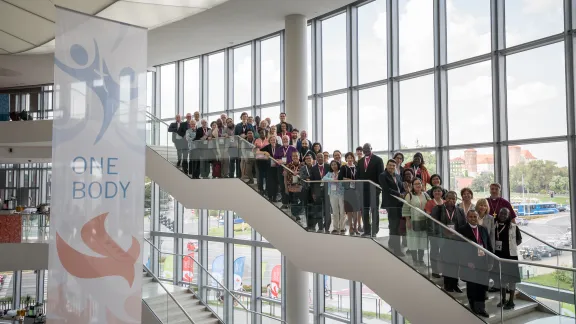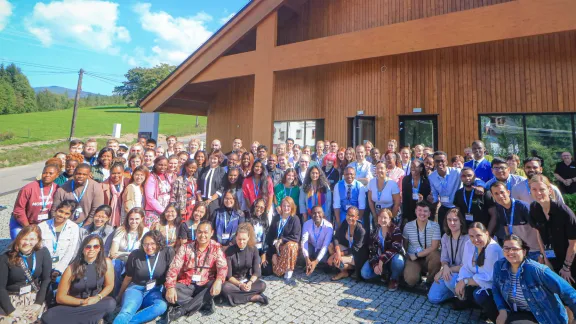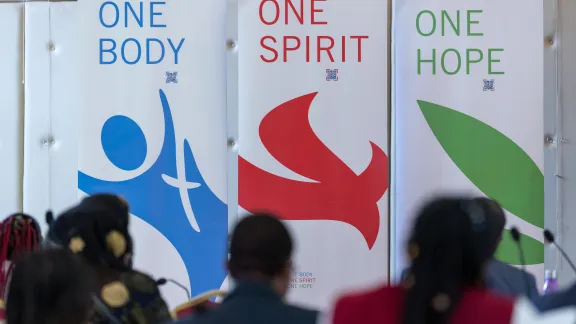Americas: Contextual perspectives on the Assembly theme
How does the Assembly theme “One Body, One Spirit, One Hope” unfold in the Latin America and Caribbean and North American regions? How does it promote unity in the communion of churches? Participants at the Pre-Assembly in Colombia deliberated on these topics, preparing to bring them to the Assembly in Krakow.
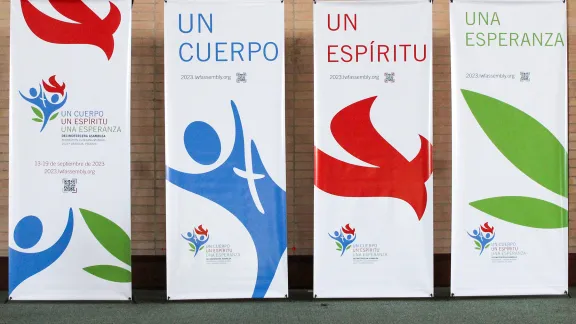
“One Body, One Spirit, One Hope” is the theme of the Thirteenth Assembly. Photo: LWF/A. Weyermüller
Unity in reconciled diversity
Unity underlines all parts of the Assembly theme, said The Lutheran World Federation (LWF) General Secretary Rev. Dr Anne Burghardt in her introduction the theme at the Pre-Assembly of the Americas in Bogotá, Colombia.
At the same time „it cannot be emphasized strongly enough that unity does not mean uniformity,” added Burghardt. "When unity is confused with uniformity the neighbors are forced to give up their gifts to conform to the dominant group.“
“Since its Assembly in Dar-es-Salaam, Tanzania, in 1977, the LWF has been committed to ‘unity as reconciled diversity.” This is a well-known principle in the ecumenical movement and a helpful principle for the LWF as a communion of churches “in understanding what unity should look like between churches who live and witness in different contexts,” Burghardt said.
In practice, “It does not mean being “indifferent to one another, but rather “accepting differences that don’t affect the core of our faith.”
Adding perspectives from the regional contexts were Rev. Marcos Jair Ebeling from the Evangelical Church of Lutheran Confession in Brazil, Rev. Danielle Dokman from the Evangelical Lutheran Church in Suriname and Bishop Dr. Larry Kochendorfer from the Evangelical Lutheran Church in Canada.
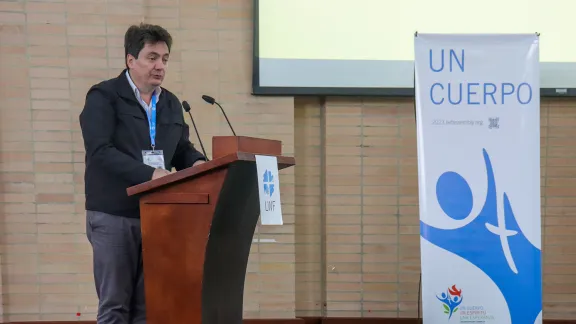
Rev. Marcos Jair Ebeling from the Evangelical Church of Lutheran Confession in Brazil. Photo: LWF/Jorge Diaz
One Body
Rev. Ebeling shared reflections from the Latin American context, reflecting on the Brazilian metropolises of São Paulo, Rio de Janeiro, Belo Horizonte and Campinas. He highlighted the challenges of small congregations in the metropolis, social inequality, the urban diaspora and the challenge of the extreme right and the churches associated with it.
Churches were quite affected by the political situation in the country from 2019-2022, said Ebeling, when an extreme right government was in power. Tensions peaked during the electoral campaign. “Most Pentecostal religious denominations and large sectors of mainline evangelical churches – Presbyterians, Baptists, Lutherans – took sides in favor of the extreme right,” Ebeling explained. “That generated a lot of internal theological reflection. Because I understand that this issue contributed to the division of the body of Christ and demands more and more reflection from each of us, I bring it here.”
This development “is about political power, especially the power to guide the hegemonic religious narrative about morality,” Ebeling said. “Throughout history, Christian morality has offered answers to people’s existential questions and, therefore, has become a producer of meaning in life and a voice of hope for humanity. Its problem lies in the fact that, through the construction of theologies and dogmas, it wants to control society by saying who can and cannot receive from the Christian hope or the proclaimed love of Christ.”
“This dispute directly impacts another problem we are experiencing in Brazil: several religious denominations relativize the defense of human rights,” Ebeling pointed out. Consequently, those involved in social, prophetic or even evangelization activities are called “communists”. Diaconal action, an inherent characteristic of the Gospel, is politicized and transformed into an accusation. “To be a body in the metropolis is to vigorously proclaim the ministry of reconciliation,” Ebeling concluded.
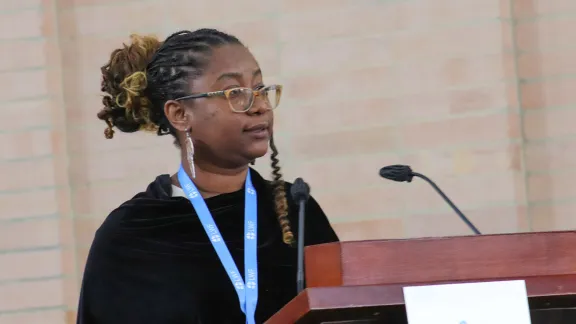
Rev. Danielle Dokman from the Evangelical Lutheran Church in Suriname. Photo: LWF/Jorge Diaz
One Spirit
Rev. Dokman identified three cries uttered by churches in the Caribbean: migration, climate justice, and technological disadvantage.
“Migration has been a constant pattern in countries with a legacy of colonialism,” she said. “As a result, Caribbean countries have indeed been impoverished by the extraction of material resources and brain drain.”
Dokman added that “inadequate leadership” is found in many layers of society and the church. “Inadequate political leadership within countries has contributed to violence, uprisings, destabilization of democratic institutions, and corruption that make life unbearable for human beings and the rest of the beings we share this world with."
Many Caribbean countries are islands. “In many instances, the ocean, sea, rivers, and all the life forms it contains are our immediate neighbors, kin, and sustenance,” Dokman said. “Yet water pollution through plastic and mining of minerals is endangering the lives of our neighbors, kin, and ourselves because we need water to survive.”
On the other hand, she said, “Excessive amounts of water will drown us.” With the drastic climate changes and rising sea levels, “many of our countries will and are already facing floods, and Caribbean islands and countries are in danger of disappearing altogether.” That was already creating poverty and economic instability in some Caribbean countries.
Another critical factor is a technological disadvantage in most countries in the global south, Dokman said. That situation has worsened in the course of the COVID-19 pandemic.
However, “as people of God, we have a rare opportunity to be engaged in God’s world today because the issues that plague our world are deeply ethical and go to the core of what it means to be human.”
“Here is precisely where the creative, reconciling, and renewing Spirit of God is manifesting itself,” she said. “Upholding and renewing those who would otherwise be crushed by the heavy weaves and tides of economic, social, religious, and political streams. Creating safe passage for those simply trying to find a decent way to live the life entrusted to them.”
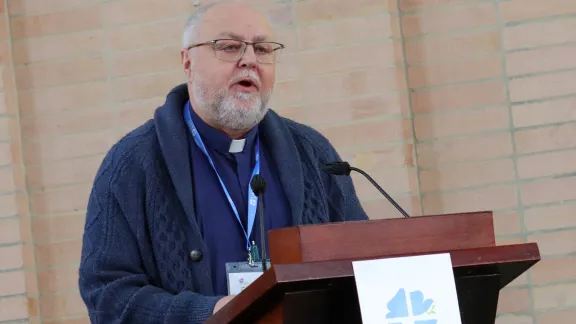
Rev. Dr. Larry Kochendorfer from the Evangelical Lutheran Church in Canada. Photo: LWF/Jorge Diaz
One Hope
“Hope is a gift of the Spirit generated not from within but created when a promise is spoken from the outside,” said Bishop Kochendorfer, offering a perspective from North America.
“Such hope – God’s continual liberating and creative activity of reconciling and renewing the world – encourages us to move forward despite difficulties and challenges.” Kochendorfer referred to Luther’s catechism that “teaches us that this hope is expressed when we pray, ‘Your kingdom come. Your will be done, on earth as it is in heaven.’”
“The Spirit compels us to participate in God’s work of establishing justice and making peace – to transformation – so that all may have abundant life,” he said. “Where we feel righteous anger at injustice and the abuse of power which we witness and experience in our societies and churches, the theme of the Thirteenth Assembly aims to ground our hope in God’s promise of peace and justice.”
Kochendorfer said the Leadership Conference of the Americas was a sign of hope, “in which the North American region was invited to participate more formally by the Latin America and the Caribbean region in 2018.” It deepened relationships and ministry and created a new partnership model across the two regions.
“This invitation from the LAC region has been a gift to the North American region as we continue to discover that we have much more in common than we have differences, that we have much to learn from one another,” Kochendorfer added.
Also, in Canada, he said, “we are building and practicing hope, though admittedly we have not fully arrived, through deepening and expanding intergenerational participation,” Kochendorfer said. “We continue to hear across our regions the desire of younger siblings in Christ for a voice at the table, including in decision-making processes and leadership opportunities.”
One Hope is realized “where everyone fully participates, where every voice is invited and welcomed, and where every voice is heard.”
The Thirteenth Assembly of the Lutheran World Federation takes place 13-19 September 2023 in Krakow, Poland. The theme of the Assembly will be "One Body, One Spirit, One Hope." It will be hosted by the Evangelical Church of the Augsburg Confession in Poland.
LWF/A. Weyermüller
